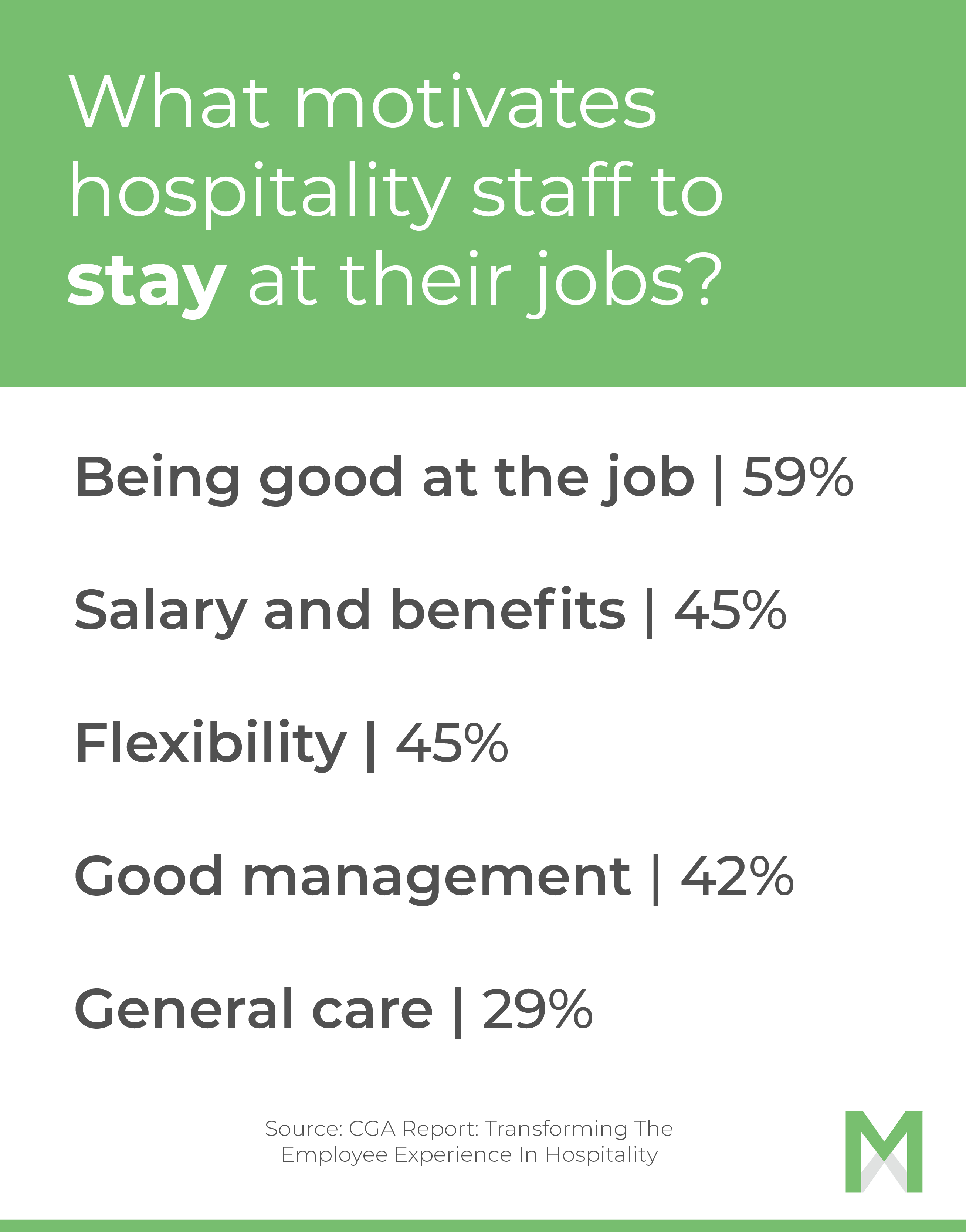Hospitality job vacancies have risen 700% year over year, Big Hospitality reported earlier this year, and every hospitality leader I’ve spoken to within the last six months has told me that staffing is a challenge. We’re seeing that play out in the market – according to The Caterer’s Hospitality Hiring Insider, salaries across the hospitality industry in the UK have risen over the past twelve months by up to 12% for some roles, with a record number of hospitality jobs offering a salary of more than £50k.
As acquiring new talent becomes both more difficult and dear, organisations can benefit from considering the broad range of factors that can make or break an employee’s experience and play a deciding role in a person’s decision to stay at (or leave) their job.
The trick is knowing where to look.
Focus on the critical role of onboarding
Benchmark research by the Brandon Hall Group underscores how vitally important onboarding is to an employee’s eventual success with their new employer, finding that those organisations with a strong onboarding process improve new hire retention by 82% – and productivity by more than 70%.
However, according to a recent paper from CGA and Harri about improving the hospitality employee experience, onboarding is an area where, more often than not, hospitality falls down. According to the paper’s findings, only 25% of new hospitality employees said their training had “left them confident to fulfill a role to the best of their ability.” Fewer than 30% were satisfied with their overall onboarding experience.
This should be a clarion call for leadership. It’s easy to imagine how, at a busy restaurant or at-capacity hotel, new employees could be left largely to fend for themselves. However, managers who assume that their new staff can ‘learn on the job’ or ‘figure it out’ are likely setting themselves – and their new employees – up for failure.
If I may offer a piece of advice: look to your onboarding. A simple way to keep everyone honest (and more importantly, help those who need some coaching) is to simply ask new hires for feedback in the form of a simple anonymous survey that allows leaders to gauge new hires’ satisfaction with the training and onboarding they received. Slice this data by team, and you’ll have a clear picture of which managers are doing a great job with your new staff, and which need some coaching.
Meet evolving staff expectations
“It’s important to remember that employees consider a wide range of factors before deciding whether or not to accept a job—not just pay, but things like flexibility and work-life balance, which have become much bigger priorities during the pandemic,” note the authors of the CGA-Harri paper I mentioned previously.
Indeed, it’s difficult to overstate the degree to which the pandemic has changed people. A global study conducted by Willis Towers Watson found that people are placing a higher value on elements such as flexible work arrangements and work-life balance. Furthermore, these elements hold significant sway for employees: 20% of the employees surveyed said they would take a new job for the same pay to meet their new priorities.
The 2022 Microsoft Work Index also bears this out, noting that people have a new “worth it” equation, described as meaning “what people want from work and what they’re willing to give in return.”
Findings from the global survey of more than 31,000 people include:
- 47% of respondents are more likely to put family and personal life over work than they were before the pandemic,
- 53% of respondents – particularly parents (55%) and women (56%)— are now more likely to prioritise their health and wellbeing over their work than they were previously,
- 52% of Gen Z and Millennials are likely to consider changing employers this year, up 3 percentage points year-over-year, driven in large part by their priorities.
So what does this mean for hospitality leaders? Quite a lot, as it turns out, when it comes to retaining staff.
Look at the factors that motivate hospitality employees to stay
 There’s no question that hospitality workers want to take pride in their work: 59% of employees surveyed by CGA said that “being good at their job” is one of the reasons they stay with their employer. This is no surprise. When people can work to their unique ability, the stage is set for excellent performance.
There’s no question that hospitality workers want to take pride in their work: 59% of employees surveyed by CGA said that “being good at their job” is one of the reasons they stay with their employer. This is no surprise. When people can work to their unique ability, the stage is set for excellent performance.
The next two factors the CGA paper found – salary and benefits – were both cited in 45% of responses, narrowly edging out good management (42%.) However, in the mix at the top of the retention factors list was a new entrant – flexibility – and was cited in 45% of responses, putting it on equal footing with salary and benefits. While compensation and a good manager have always been instrumental in the retention equation, flexibility is a new variable.
I’m using the word ‘variable’ intentionally, because the notion of ‘flexibility’ carries many different meanings, however, looking more closely at the findings from the CGA paper, one gets a clearer picture of what hospitality staff are seeking when they say they’re seeking more flexibility.
Ensure employees have some degree of autonomy
Flexible working & hospitality should not be mutually exclusive. While hospitality staff generally expect in many cases to work evenings and weekends, “lots of unsociable hours” was the most commonly given reason for an employee’s decision to leave a job, according to the CGA paper, followed closely by increased workloads due to staff shortages.
Taken together, the meaning is clear: employees are being asked (or, in some cases, required) to take on additional shifts, impacting their personal time.
An article I read recently asserted that what people really want from their employers isn’t flexibility, they want more autonomy. That certainly could be the case for the employees described above, as it relates to their time.
Having some agency over one’s life, and being able to enjoy one’s friends and family is reasonable. However, ensuring employees have some degree of autonomy is important for other reasons, including the monstrously negative effects mandates have on people and the simple fact that people’s priorities are changing.
Put an end to manager-dictators
It’s no secret that some aspects of hospitality have a history of mercurial leaders. However, I submit that it’s time for the manager-as-dictator to be banished to the dust heap of yore, as today’s employees simply won’t endure poor treatment.
In particular, the expectation that a manager can issue a mandate to employees is especially dangerous to organisations at this time, even though for many, this is the ‘way it’s always been done.’
Here is why.
Mandates, as it turns out, are received in our brains as threats, and when issued, can be more damaging to employees than we may imagine. In a fascinating article titled, ‘Why Mandates Make Us Feel Threatened,’ the authors note that receiving a mandate is perceived as a violation of one’s autonomy, which happens to be one of the five most important intrinsic drivers of threat and reward in the brain.
“Autonomy is a feeling of being in control and having a choice. When we have choices, we experience natural rewards of feeling positive,” write the authors. “Research shows that even affording a little autonomy can go a long way: When employees at one company were given the opportunity to choose how to decorate their workspaces, their productivity increased up to 25%.”
However, when people perceive that choices are being removed, the authors note, the reactions can be very strong, ranging from frustration to fury.
Even if your organisation doesn’t tolerate domineering behaviours in its managers, even well-meaning leaders can give employees the impression they don’t care or don’t respect peoples’ needs when, as they attempt to fill gaps in service resulting from being short-staffed, mandate that employees work longer hours or take extra shifts, are likely making their own situations worse.
If staff retention is a particular issue for your organisation, it may be well worth your time to explore how much autonomy your employees feel they have and invite your managers to consider how more flexible work schedules can be offered to staff. This is one of those incredibly important factors that have a stunning impact on the business, and yet can be hidden far out of executives’ view.
The path forward for hospitality
Hospitality leaders aren’t the only ones having to re-think their employee value propositions, and challenge ‘the way we’ve always done it.’ Today’s employees have more options and creating an appealing workplace and a good employee experience are strategic necessities.
Unlike many other industry leaders, however, hospitality executives have some fantastic trump cards up their sleeves that are worth emphasising. Dynamic careers, fantastic properties, inspiring colleagues, and the ability to bring delight to others are intrinsic characteristics of the hospitality business that are unique and compelling.
“Both employees and employers recognise that demand for a better work-life balance has massively increased during the pandemic. Where possible, increasing flexibility over shift patterns and helping people fit their work around other commitments could give employers an advantage in recruitment,” notes the Harri/CGA paper.
The organisations that can tap into these wonderful elements, whilst adjusting their operating procedures and mindsets to deliver fantastic onboarding, address employees’ evolving needs and expectations, and enable employees to enjoy a degree of agency over their experience at work will find themselves in a position to not just survive but thrive.



